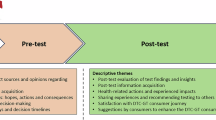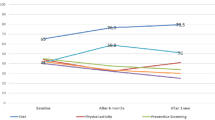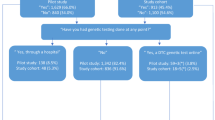Abstract
Direct-to-consumer genetic testing (DTC-GT) is becoming increasingly widespread. The aim of this research was to systematically review the literature published on healthcare professionals’ knowledge and views about DTC-GT, as an update to a 2012 systematic review. The secondary aim was to assess the knowledge and views of healthcare professionals on the ethical and legal issues pertaining to DTC-GT. A systematic search was performed to identify all relevant studies that have been conducted since 2012. Studies fulfilled the inclusion criteria if they were primary research papers conducted on healthcare professionals about their knowledge and views on health-related DTC-GT. PubMed, Embase, CINAHL, PsycINFO and Medline databases were searched from 2012 to May 2021. Title and abstract were screened, and full texts were reviewed by two study authors independently. New papers included were appraised and data were extracted on study characteristics, knowledge and views on DTC-GT, and ethical and legal issues. A narrative synthesis was conducted. Nineteen new papers were included, along with eight papers from the previous review. There was considerable variation in study participants with differing views, awareness levels, and levels of knowledge about DTC-GT. Genetic counsellors and clinical geneticists generally had more concerns, experience, and knowledge regarding DTC-GT. Ten ethical concerns and four legal concerns were identified. Healthcare professionals’ knowledge and experience of DTC-GT, including awareness of DTC-GT ethical and legal concerns, have only minimally improved since the previous review. This emphasises the need for further medical learning opportunities to improve the gaps in knowledge amongst healthcare professionals about DTC-GT.
This is a preview of subscription content, access via your institution
Access options
Subscribe to this journal
Receive 12 print issues and online access
$259.00 per year
only $21.58 per issue
Buy this article
- Purchase on SpringerLink
- Instant access to the full article PDF.
USD 39.95
Prices may be subject to local taxes which are calculated during checkout


Similar content being viewed by others
References
Levitt DM. Let the consumer decide? The regulation of commercial genetic testing. J Med Ethics. 2001;27:398–403.
Howard HC, Borry P. Survey of European clinical geneticists on awareness, experiences and attitudes towards direct-to-consumer genetic testing. Genome Med. 2013;5:45.
Dandara C, Greenberg J, Lambie L, Lombard Z, Naicker T, Ramesar R, et al. Direct-to-consumer genetic testing: To test or not to test, that is the question. S Afr Med J. 2013;103:510–2.
Covolo L, Rubinelli S, Ceretti E, Gelatti U. Internet-based direct-to-consumer genetic testing: a systematic review. J Med Internet Res. 2015;17:e279.
Howard HC, Borry P. To ban or not to ban? Clinical geneticists’ views on the regulation of direct‐to‐consumer genetic testing. EMBO Rep. 2012;13:791–4.
23andMe—Compare our DNA Tests. 23andMe. 2021. https://www.23andme.com/en-eu/compare-dna-tests/.
Goldsmith L, Jackson L, O’Connor A, Skirton H. Direct-to-consumer genomic testing from the perspective of the health professional: a systematic review of the literature. J Community Genet. 2013;4:169–80.
Page MJ, Moher D, Bossuyt PM, Boutron I, Hoffmann TC, Mulrow CD, et al. PRISMA 2020 explanation and elaboration: updated guidance and exemplars for reporting systematic reviews. BMJ. 2021;372:n160.
Cooke A, Smith D, Booth A. Beyond PICO: the SPIDER tool for qualitative evidence synthesis. Qual Health Res. 2012;22:1435–43.
Dobrescu AI, Nussbaumer SB, Klerings I, Wagner G, Persad E, Sommer I, et al. Restricting evidence syntheses of interventions to English-language publications is a viable methodological shortcut for most medical topics: a systematic review: Excluding English-language publications a valid shortcut. J Clin Epidemiol. 2021;137:209–17.
Shamseer L, Moher D, Clarke M, Ghersi D, Liberati A, Petticrew M, et al. Preferred reporting items for systematic review and meta-analysis protocols (PRISMA-P) 2015: elaboration and explanation. BMJ Br Med J. 2015;349:g7647.
Critical Appraisal Skills Programme (2018). CASP Qualitative Studies Checklist. 2021. https://casp-uk.net/casp-tools-checklists/.
Beauchamp TL. The ‘four principles’ approach to health care ethics. In: Ashcroft RE, editor. Principles of Health Care Ethics. 2nd edn. Chichester, West Sussex, UK: Wiley; 2007.
Beauchamp T, Childress J. Principles of biomedical ethics. 5th edn. New York: Oxford University Press; 2001.
Guide to Professional Conduct and Ethics for Regiistered Mediical Practitioners (Amended), 2019. https://msurgery.ie/wp-content/uploads/2018/12/Guide-to-Professional-Conduct-and-Ethics-8th-Edition-2016-.pdf.
Regulation (EU) 2017/746 of the European Parliament and of the Council of 5 April 2017 on in vitro diagnostic medical devices and repealing Directive 98/79/EC and Commission Decision 2010/227/EU. OJEU L 117. 2017;60:176–332. 2017. https://eur-lex.europa.eu/legal-content/EN/TXT/PDF/?uri=CELEX:32017R0746.
The Genetic Information Nondiscrimination Act (GINA) of 2008. 2008. https://www.eeoc.gov/statutes/genetic-information-nondiscrimination-act-2008.
ETS 164—Convention on Human Rights and Biomedicine, 4.IV.1997. Council of Europe. https://rm.coe.int/168007cf98.
(FDA) FDA. Direct-to-Consumer Genetic Tests. 2019. https://www.fda.gov/medical-devices/in-vitro-diagnostics/direct-consumer-tests.
Regulation (EU) 2016/679 of the European Parliament and of the Council of 27 April 2016 on the protection of natural persons with regard to the processing of personal data and on the free movement of such data, and repealing Directive 95/46/EC (General Data Protection Regulation) (Text with EEA relevance). 2016. https://ec.europa.eu/competition/publications/reports/kd0419345enn.pdf.
Chambers CV, Axell-House DB, Mills G, Bittner-Fagan H, Rosenthal MP, Johnson M, et al. Primary care physicians’ experience and confidence with genetic testing and perceived barriers to genomic medicine. J Fam Med. 2015;2:1024.
Kalokairinou L, Borry P, Howard HC. Attitudes and experiences of European clinical geneticists towards direct-to-consumer genetic testing: a qualitative interview study. N Genet Soc. 2019;38:410–29.
Kalokairinou L, Borry P, Howard HC. ‘It’s much more grey than black and white’: clinical geneticists’ views on the oversight of consumer genomics in Europe. Per Med. 2020;17:129–40.
Bernhardt BA, Zayac C, Gordon ES, Wawak L, Pyeritz RE, Gollust SE. Incorporating direct-to-consumer genomic information into patient care: attitudes and experiences of primary care physicians. Per Med. 2012;9:683–92.
Birmingham WC, Agarwal N, Kohlmann W, Aspinwall LG, Wang M, Bishoff J, et al. Patient and provider attitudes toward genomic testing for prostate cancer susceptibility: a mixed method study. BMC Health Serv Res. 2013;13:279.
Burke S, Mork M, Qualmann K, Woodson A, Jin Ha M, Arun B, et al. Genetic counselor approaches to BRCA1/2 direct-to-consumer genetic testing results. J Genet Couns. 2021;30:803–12.
Carroll JC, Makuwaza T, Manca DP, Sopcak N, Permaul JA, O’Brien MA, et al. Primary care providers’ experiences with and perceptions of personalized genomic medicine. Can Fam Physician. 2016;62:e626–35.
Carroll JC, Allanson J, Morrison S, Miller FA, Wilson BJ, Permaul JA, et al. Informing integration of genomic medicine into primary care: an assessment of current practice, attitudes, and desired resources. Front Genet. 2019;10:1189.
Haga SB, Kim E, Myers RA, Ginsburg GS. Primary care physicians’ knowledge, attitudes, and experience with personal genetic testing. J Pers Med. 2019;9:29.
Hsieh V, Braid T, Gordon E, Hercher L. Direct-to-consumer genetic testing companies tell their customers to ‘see a genetic counselor’. How do genetic counselors feel about direct-to-consumer genetic testing? J Genet Couns. 2021;30:191–7.
Jonas MC, Suwannarat P, Burnett-Hartman A, Carroll N, Turner M, Janes K, et al. Physician experience with direct-to-consumer genetic testing in Kaiser permanente. J Pers Med. 2019;9:47.
Leighton JW, Valverde K, Bernhardt BA. The general public’s understanding and perception of direct-to-consumer genetic test results. Public Health Genom. 2012;15:11–21.
Mainous AG 3rd, Johnson SP, Chirina S, Baker R. Academic family physicians’ perception of genetic testing and integration into practice: a CERA study. Fam Med. 2013;45:257–62.
McGrath SP, Walton N, Williams MS, Kim KK, Bastola K. Are providers prepared for genomic medicine: interpretation of Direct-to-Consumer genetic testing (DTC-GT) results and genetic self-efficacy by medical professionals. BMC Health Serv Res. 2019;19:844.
Unim B, De Vito C, Hagan J, Villari P, Knoppers BM, Zawati M. The provision of genetic testing and related services in Quebec, Canada. Front Genet. 2020;11:127.
Salm M, Abbate K, Appelbaum P, Ottman R, Chung W, Marder K, et al. Use of genetic tests among neurologists and psychiatrists: knowledge, attitudes, behaviors, and needs for training. J Genet Couns. 2014;23:156–63.
Ram S, Russell B, Gubb M, Taylor R, Butler C, Khan I, et al. General practitioner attitudes to direct-to-consumer genetic testing in New Zealand. N Z Med J. 2012;125:14–26.
Kittikoon S, Pithukpakorn M, Pramyothin P. Physician awareness, preparedness, and opinions toward consumer-initiated genetic testing in Thailand: views from a changing landscape. J Genet Counsel. 2021;30:1535–43.
Gammal RS, Smith DM, Wiisanen KW, Cusimano JM, Pettit RS, Stephens JW, et al. The pharmacist’s responsibility to ensure appropriate use of direct-to-consumer genetic testing. JACCP J Am Coll Clin Pharm. 2021;4:652–8.
Brett GR, Metcalfe SA, Amor DJ, Halliday JL. An exploration of genetic health professionals’ experience with direct-to-consumer genetic testing in their clinical practice. Eur J Hum Genet. 2012;20:825–30.
National Doctors Training and Planning: Review of the Clinical Genetics Medical Workforce in Ireland. HSE; 2019. https://www.hse.ie/eng/staff/leadership-education-development/met/plan/specialty-specific-reviews/clinical-genetics-2019.pdf.
Hock KT, Christensen KD, Yashar BM, Roberts JS, Gollust SE, Uhlmann WR. Direct-to-consumer genetic testing: an assessment of genetic counselors’ knowledge and beliefs. Genet Med. 2011;13:325–32.
Tandy-Connor S, Guiltinan J, Krempely K, LaDuca H, Reineke P, Gutierrez S, et al. False-positive results released by direct-to-consumer genetic tests highlight the importance of clinical confirmation testing for appropriate patient care. Genet Med. 2018;20:1515–21.
Ohata T, Tsuchiya A, Watanabe M, Sumida T, Takada F. Physicians’ opinion for ‘new’ genetic testing in Japan. J Hum Genet. 2009;54:203–8.
Powell KP, Cogswell WA, Christianson CA, Dave G, Verma A, Eubanks S, et al. Primary care physicians’ awareness, experience and opinions of direct-to-consumer genetic testing. J Genet Couns. 2012;21:113–26.
National Consent Policy. HSE: Quality & Patient Safety Division; 2013. https://www.hse.ie/eng/health/immunisation/hcpinfo/conference/waterford9.pdf.
Phillips AM. Reading the fine print when buying your genetic self online: direct-to-consumer genetic testing terms and conditions. N. Genet Soc. 2017;36:273–95.
Bunnik EM, Janssens ACJW, Schermer MHN. Informed consent in direct-to-consumer personal genome testing: the outline of a model between specific and generic consent. Bioethics. 2014;28:343–51.
Explore 23andMe’s scientific discoveries. 23andMe. 2021. https://www.23andme.com/publications/.
Rafiq M, Ianuale C, Ricciardi W, Boccia S. Direct-to-consumer genetic testing: a systematic review of european guidelines, recommendations, and position statements. Genet Test Mol Biomark. 2015;19:535–47.
Acknowledgements
We would like to thank William Frank Randall for reviewing and making suggestions on an earlier report of this study.
Funding
No specific funding was provided to support this work. LTM is funded by the Health Research Board (grant no. ILP-HSR-2019-006).
Author information
Authors and Affiliations
Contributions
MM conceived the study, MM and FM designed the study, MM and LT screened records, MM extracted data and FM verified data, MM, LTM and FM analysed the data, MM drafted the paper and all authors provided critical revisions.
Corresponding author
Ethics declarations
Competing interests
The authors declare no competing interests.
Additional information
Publisher’s note Springer Nature remains neutral with regard to jurisdictional claims in published maps and institutional affiliations.
Supplementary information
Rights and permissions
Springer Nature or its licensor holds exclusive rights to this article under a publishing agreement with the author(s) or other rightsholder(s); author self-archiving of the accepted manuscript version of this article is solely governed by the terms of such publishing agreement and applicable law.
About this article
Cite this article
Martins, M.F., Murry, L.T., Telford, L. et al. Direct-to-consumer genetic testing: an updated systematic review of healthcare professionals’ knowledge and views, and ethical and legal concerns. Eur J Hum Genet 30, 1331–1343 (2022). https://doi.org/10.1038/s41431-022-01205-8
Received:
Revised:
Accepted:
Published:
Version of record:
Issue date:
DOI: https://doi.org/10.1038/s41431-022-01205-8
This article is cited by
-
Navigating direct-to-consumer genetic testing: experiences, decisions and perspectives of Dutch users
European Journal of Human Genetics (2026)
-
Predictive testing for Huntington’s disease in a digital age; patient power with potential pitfalls
European Journal of Human Genetics (2025)
-
Genetic knowledge and attitudes toward genomics across academic disciplines, a cross-sectional survey of university students in Samborondón, greater Guayaquil, Ecuador
Journal of Community Genetics (2025)
-
A Double-Edged Sword: Ethical and Psychological Implications of APOE Genotype Disclosure Across the Lifespan
Neuroethics (2025)
-
It Bugs Me: Critical Encounters with Direct-to-Consumer Microbiome Testing
Food Ethics (2025)



